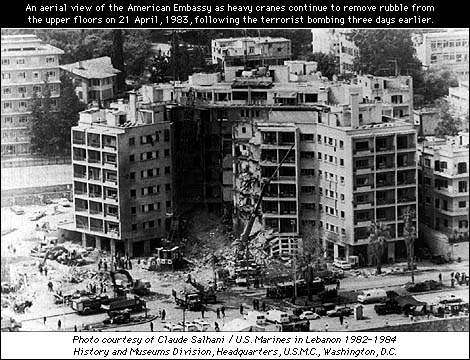 JACKSONVILLE – Every day on her way to work, Ruthann Bland drives alongside the column of pear trees, past the memorial and its solitary bronze Marine.Every day, she remembers her husband, the pictures on the television and the knock at the door.A 58-year-old Hubert resident, Bland lost her husband, Lance Cpl. Stephen Bland, on Oct. 23, 1983, a truck packed with explosives crashed through a barricade, past a sentry post and into the lobby of a Marine compound – 241 U.S. troops were killed, most of them Marines and sailors from 1st Battalion, 8th Marines. Stephen Bland was one of them."I was actually asleep, and I got a phone call," Ruthann Bland said. "It was my neighbor across the street asking me how my husband was. She said to go turn the TV on. That’s when I saw the building had been bombed."It was days before she was told her husband had died in the blast. "The whole time I’m thinking, I just got a letter from my husband," she said. "I’m really optimistic that it’s not him. I got the knock on the door, I was totally blown away."The bombing that killed Bland’s husband and his comrades remains the worst terrorist attack against Americans on foreign soil. Here in Jacksonville, it’s nearly impossible to forget about the Beirut tragedy. The pear trees lining N.C. 24 represent the lives lost, and a somber memorial sits close to the Camp Johnson gate.
JACKSONVILLE – Every day on her way to work, Ruthann Bland drives alongside the column of pear trees, past the memorial and its solitary bronze Marine.Every day, she remembers her husband, the pictures on the television and the knock at the door.A 58-year-old Hubert resident, Bland lost her husband, Lance Cpl. Stephen Bland, on Oct. 23, 1983, a truck packed with explosives crashed through a barricade, past a sentry post and into the lobby of a Marine compound – 241 U.S. troops were killed, most of them Marines and sailors from 1st Battalion, 8th Marines. Stephen Bland was one of them."I was actually asleep, and I got a phone call," Ruthann Bland said. "It was my neighbor across the street asking me how my husband was. She said to go turn the TV on. That’s when I saw the building had been bombed."It was days before she was told her husband had died in the blast. "The whole time I’m thinking, I just got a letter from my husband," she said. "I’m really optimistic that it’s not him. I got the knock on the door, I was totally blown away."The bombing that killed Bland’s husband and his comrades remains the worst terrorist attack against Americans on foreign soil. Here in Jacksonville, it’s nearly impossible to forget about the Beirut tragedy. The pear trees lining N.C. 24 represent the lives lost, and a somber memorial sits close to the Camp Johnson gate.
And every year, on the day that building came crashing down, people gather to remember.
This year’s ceremony, scheduled for Sunday at 2:30 p.m. at the memorial, will feature the commandant of the Marine Corps, Gen. Michael W. Hagee, who commanded 1/8 from 1988 to 1990.
Members of 1/8, who recently returned from aiding Gulf Coast hurricane victims, will serve as the event’s color guard, escorts and participate in the wreath-laying ceremony.
The Military Order of the Devil Dogs of the Marine Corps League, who dedicated the first memorial to the Beirut victims in 1984 at the Camp Geiger Memorial Circle, will also hold a ceremony on Sunday at 5 p.m. at the circle.
It’s a somber and beautiful way to remember both the lost Americans and the way their sacrifice brought the community together, said Mike Ellzey, a member of the memorial’s advisory committee.
"What the bombing did to the entire community was made everybody recognize these guys are our neighbors," Ellzey said. "Unfortunately, it took a bombing to bring us together. It’s really made us one community instead of two separate communities."
The annual observance, which began in 1986, usually attracts families from near and far looking to pay respect, said Ellzey. And while the number of families who attend from out of town has dwindled, there are still a couple new families who show up every year.
Bland doesn’t attend the memorial service every year.
"I do appreciate what the town does," she said. "This town has kept the memory of the guys alive. Actually, it’s a depressing day. Every year it’s like celebrating a death."
But she is never far from the memorial. She works at Camp Johnson and often spends her lunch breaks among the memorial’s stones.
"I sit on the side brick wall," she said. "I just sit there. It’s all around us, and it’s something I think about every day."



